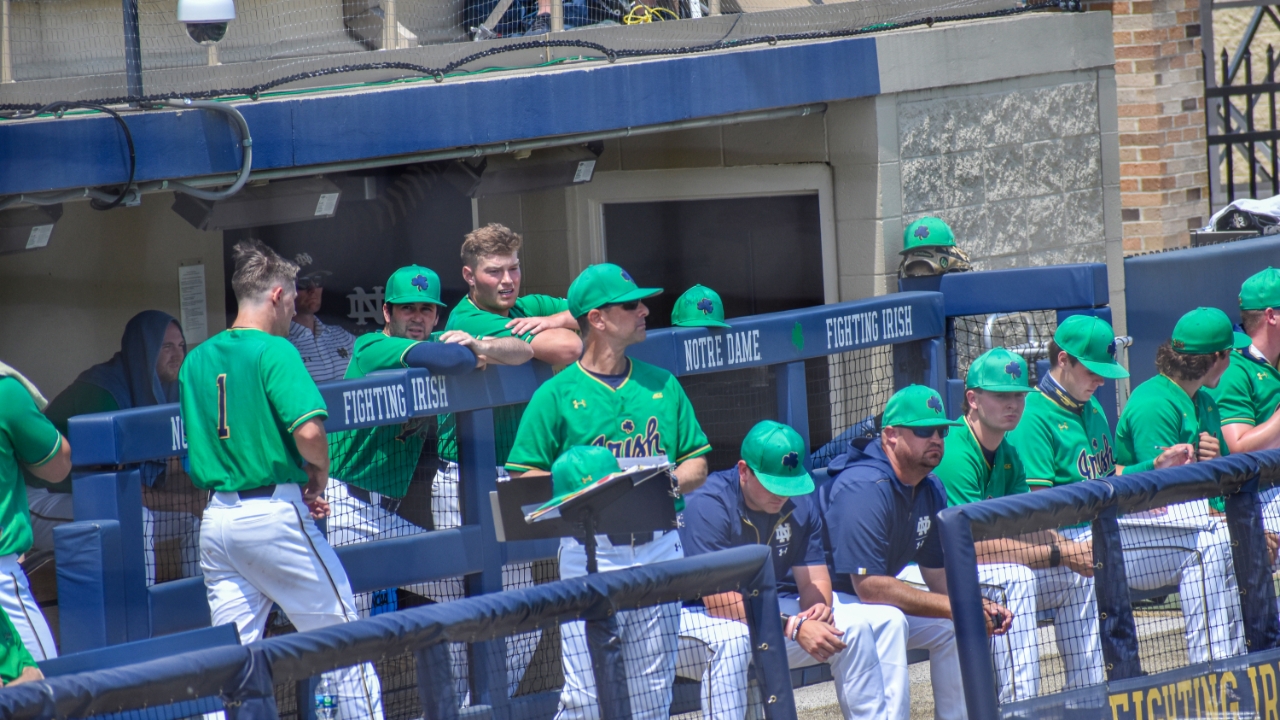
A remarkable, breakthrough season for Notre Dame baseball – the type the program had not generated in nearly two decades – abruptly ended Monday night beneath a cacophony of cow bells and an undeniable question of “What if?”.
Host Mississippi State catapulted on top of the Fighting Irish with a six-run second inning and never trailed after the first half-inning in an 11-7 win in Game 3 of the Starkville Super Regional inside a sold-out Dudy Noble Field.
The Bulldogs (45-16) trailed in each of the three games but won the first and third for a return trip to Omaha, Nebraska, and the College World Series – their third-straight trip to the sport's final eight and 12th time to the CWS.
In so doing, they denied the Fighting Irish (34-13) what would have been the program's third all-time trip and first since 2002, though Notre Dame outscored its hosts, 24-21, in the three-game set.
“Just moving forward from this, learning how to play in these games, the experience is irreplaceable,” said Irish coach Link Jarrett, now 45-15 in his first 60 games as head coach. “We can talk about this. We can pretend that we've been in these settings as a team. … These guys have not played a postseason game. The essence of each pitch being so critical and the margin of error being so slim.
“The winner-take-all type of game, you can profess to work on that winner-take-all mentality but until you get in one and experience it in this setting, it's unique. You can now file this away as a team experience and the individuals can reflect on what this felt like. You see a team dog-pile on the mound and you want to experience that yourself. You know the chinks we endured throughout these games, Game 1 and Game 3 that kept us from having a dog-pile. You'll never forget the mistakes, and you'll also never forget the positive moments that you had. You lump all that together and there's no way to substitute for that experience. It's very valuable, and it will help.”
Notre Dame cycled through four pitchers in less than two innings – starter Will Mercer lasted just one-plus innings and was charged with the loss after he allowed four runs, three earned. Reliever Alex Rao allowed three earned in two-thirds of a frame.
In all, the Fighting Irish used five hurlers – including Game 1 starter John Michael Bertrand. The Furman transfer and season-long ace retired the final 10 Bulldogs batters and allowed just one earned run.
Bertrand has already told Jarrett he would return in 2022; some of Notre Dame's other seniors – Ryan Cole, Spencer Myers, David LaManna and Jared Miller – also could return. Jarrett declared his squad likely would lose hard-throwing pitcher Tanner Kohlhepp, “some other seniors” and also spoke to the lasting impact of outgoing senior Niko Kavadas, the local slugger who charged the Irish back into this with the record-extending 22nd home run of his farewell campaign.
“Niko Kavadas is an intense, very productive, first-class player, first-class person,” Jarrett said. “Team captain. Delivers for us. A championship team. We won two championships (Atlantic Coast Conference regular season, South Bend Regional). That's not easy to do. He was right there in the middle of it. …
“He can carry any team at any level. That will translate to a wooden bat (at the professional level). He's not played his last game by any stretch. I can't say enough about him helping guide us through our transition. The guys bought in. I can't say enough about that.”
Notre Dame got eight hits and five runs batted in from its senior-level players in this contest. It also got Carter Putz's two-RBI double in the fifth as it tried to scratch its way out of 10-1, fourth-inning deficit.
“We just kind of dug ourselves into a little bit of a hole,” Putz said. “One thing I will say is that I'm super-proud of all of our guys. We never gave up, fought to the final out. I think we just have to use this as fuel. Remember what all the seniors taught us this year, all the grad students, use that as motivation and continue to carry out this goal of getting to Omaha.”
With their late-innings rally not enough, the Irish are left to ponder how they played overwhelmingly their best offensive baseball of the season in their six NCAA postseason games – 74 runs, 21 homers – but let their NCAA-best defense commit six errors during the three-game finale.
Part of that might entirely have been out of Notre Dame's control.
What Mississippi State showcased throughout the weekend with its spectacular baseball home, Dudy Noble Field, and its nearly $70-million rebuild completed just two years ago, also crystalized what the Irish do not have.
Their stadium's official capacity is less than 2,000.
They have no outfield seats, no video board, no particular fan amenities. The press box is undersized.
State drew nearly 40,000 fans in three games; Notre Dame’s three sellouts in the South Bend Regional amassed a total of 5,475 fans – less than half the attendance in any one of the Bulldogs’ three final home games.
Jarrett also has worked to improve some elements of his program's home. There is more to be done.
And the reigning ACC Coach of the Year could not rule out that Notre Dame's lack of home accoutrements wasn't a factor in his team's forced road journey in the Super Regionals. Two other ACC teams – North Carolina State and Virginia – advanced to the CWS despite the fact that the league did not have any program seeded higher than Notre Dame at No. 10.
“I don't … I don't know,” Jarrett said. “Obviously our facility doesn't accommodate this number of fans. I don't know if that's a factor when they go down the list. I don't know. I need to find out. I'll do my best.
“It's tricky to win these on the road, and we got a very good, a national championship-caliber team, and I felt like we were in that conversation. When you win the conference by five games (4.5) outright, I was frustrated that you weren't a national seed because I ask myself as a coach, 'What more could a team do when you have to play that many conference games and you're the only team that's separated itself from the field?'
“Our league was very good. It's designed for you to have an easier path when you're at home, no doubt about it. The field, the fans, the dimensions that you're accustomed to. When you have the largest crowd in the history of a three-game college series here, you know that factors in. I don't think it overwhelmed our team by any stretch, but it does give the home team that little bit of edge of energy and the timing of the energy helps.
“I don't know why we weren't. I'll find out. I don't know.”
